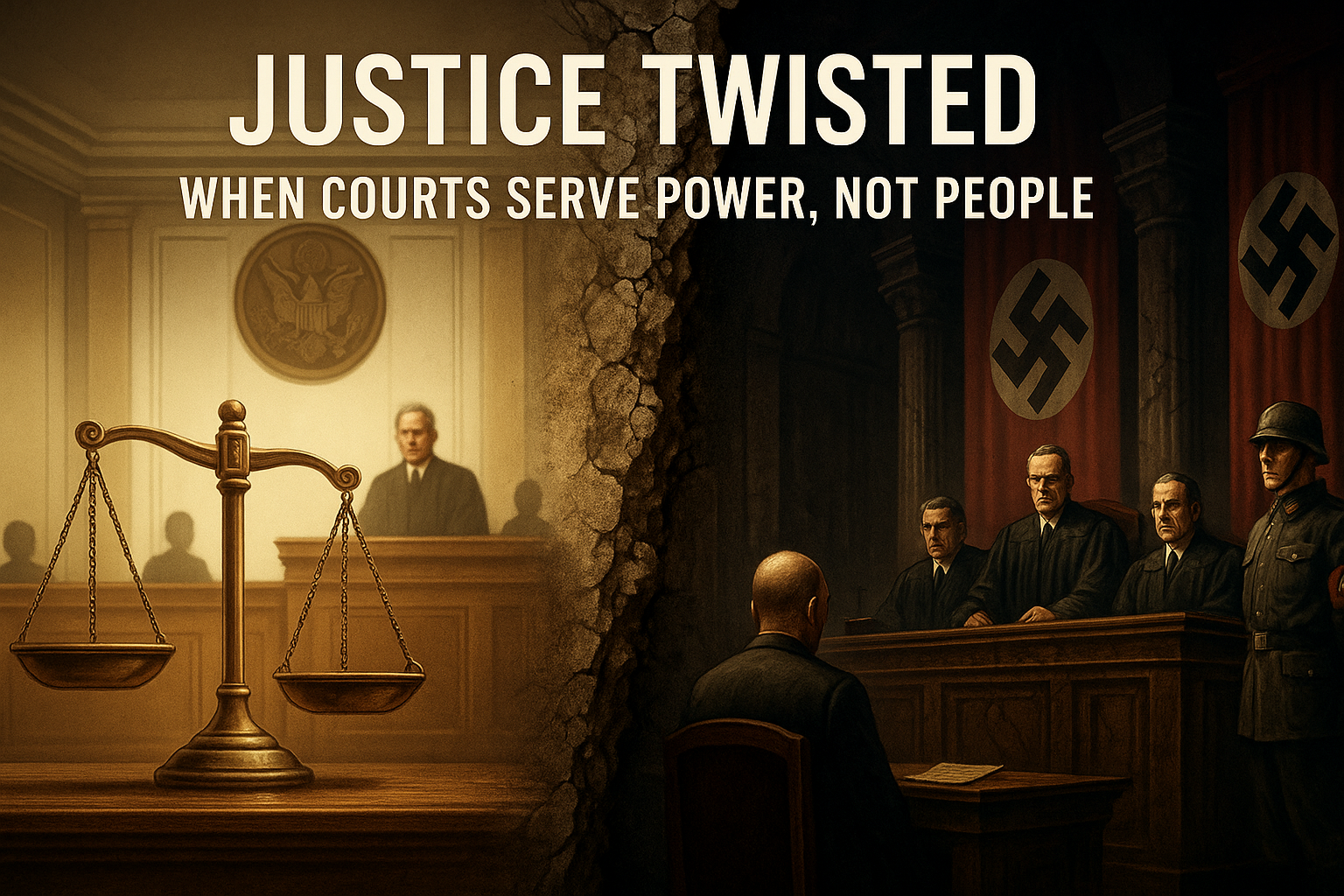Introduction:
Courts are often seen as the cornerstone of justice, upholding the rule of law and safeguarding democracy. Yet history reminds us that even these vital institutions can be hollowed out and turned into tools of oppression under authoritarian regimes. When laws are manipulated, and courts prioritize obedience to authority over the principles of fairness and equity, society declines—not in dramatic, singular moments, but through incremental erosions of liberty.
In this in-depth exploration, we’ll examine historical and modern examples of how courts have enabled authoritarianism, from Hitler’s Germany to contemporary regimes like China, Russia, and Iran. We’ll then shift focus to democratic societies, including the United States, to unpack the growing concerns around judicial independence and legal manipulation. By the end, you’ll gain a clearer understanding of how the rule of law can both defend and endanger democracy—and what we must do to protect it.
Section 1: The German Judiciary and Its Role in Hitler’s Rise to Power
To understand how courts can transition from protectors of democracy to enablers of tyranny, we start with one of history’s most chilling examples: the rise of Adolf Hitler in Germany.
When Hitler became Chancellor of Germany in 1933, the German judiciary did not resist. Instead, it adapted to the new political reality, becoming an instrument for legitimizing Nazi rule. Judges began interpreting laws in ways that aligned with Nazi goals, rather than challenging or upholding democratic principles.
One key moment in this transition was the judiciary’s support for Article 48 of the Weimar Constitution. This clause allowed for emergency measures, granting Hitler sweeping powers to suspend civil liberties, suppress opposition, and bypass parliamentary consent. These actions, though blatantly authoritarian, gained a superficial veneer of legitimacy because they were upheld by the courts. The judiciary also enforced laws like the Nuremberg Laws, which institutionalized racial discrimination, effectively becoming complicit in Nazi objectives.
While isolated judges resisted, they were crushed or removed. Jewish judges and those deemed politically unreliable were purged from the judiciary and replaced with compliant individuals loyal to Nazi ideology. Even legal education was restructured to indoctrinate future generations in Nazi doctrines, ensuring their long-term influence. The German experience offers a stark warning: when courts abandon the principles of justice, they pave the way for unchecked power.
Section 2: Modern Parallels – Authoritarianism in Global Legal Systems
This pattern of subverting legal systems is not confined to history. Authoritarian regimes today use similar tactics, albeit adapted to modern political landscapes.
China:
In China, the judiciary exists to reinforce state control rather than protect individual rights. Courts are subordinate to the Communist Party, which ensures that laws are written—or interpreted—in ways that prioritize state power. For instance, vague laws on dissent give authorities the flexibility to suppress opposition while maintaining a facade of legality. Legal education and public awareness campaigns further entrench this system, promoting “legal literacy” among citizens—but not to empower them. Instead, it serves to increase compliance with state mandates.
Russia:
Under Vladimir Putin, the Russian judiciary is often a stage for political repression rather than an impartial arbiter of justice. High-profile trials of opposition figures, such as Alexei Navalny, are designed to demonstrate the regime’s dominance. While Russia’s legal system appears functional on the surface, outcomes are often predetermined behind closed doors, illustrating what happens when courts prioritize the government’s interests over legal norms.
Iran:
Iran’s judiciary blends Islamic law with authoritarian governance, serving as a tool for clerical power. Broad charges like “spreading corruption on earth” are used to silence dissent, providing the regime sweeping powers to criminalize criticism. Here too, the legal system is more about maintaining the appearance of order than delivering impartial justice.
Across these cases, we see a common thread: courts under authoritarian regimes may maintain a facade of legality, but their true purpose becomes reinforcing the power of the state.
Section 3: Democratic Systems Under Stress: Approaching Red Lines
Democratic governments, by design, are meant to function differently. The rule of law is foundational, acting as a check on power rather than an enabler of it. However, even democracies can experience stress, as courts and legal systems come under political pressure.
In the United States, concerns have grown in recent years over potential erosion of judicial independence. During the Trump administration, critics pointed to expanded executive power, including the repurposing of obscure laws for legally questionable justifications. Emergency powers, for instance, were used in ways that significantly tested constitutional limits, such as declaring parts of the southern U.S. border as a “national defense area.”
Additionally, the administration’s public attacks on judges and unfavorable rulings raised alarms. Critics argue that these actions undermined the perception of judicial independence. Courts, however, pushed back against some of the administration’s legal maneuvers, blocking several executive actions. Nonetheless, a more recent Supreme Court ruling limiting the power of federal judges to issue nationwide injunctions against executive orders sparked further debate about whether legal standards are being weakened.
While these examples fall far short of authoritarianism, scholars warn that they represent warning signs. Authoritarianism rarely arrives as a sudden collapse of democracy; rather, it “creeps in” incrementally, normalizing legal and cultural shifts until they are entrenched.
Section 4: The Role of Citizens in Defending Judicial Integrity
History shows that courts alone cannot safeguard democracy. Judges and legal scholars may hold the line, but they require public support to remain independent. Citizens are the ultimate safeguard against authoritarianism—but only if they remain vigilant and engaged.
Warning Signs to Watch For
- Efforts to undermine judicial independence.
- Expansions of executive power—particularly if unchecked by other branches.
- Curtailment of due process for vulnerable groups.
- Legal marginalization or selective application of laws targeting specific groups.
When these trends emerge, they represent red flags that the legal system is being manipulated for political ends. Public pushback and accountability are crucial to counter these developments before they become irreversible.
Actionable Steps for Citizens
- Stay Informed: Understand the legal system, recent rulings, and how laws affect democratic principles.
- Hold Leaders Accountable: Question actions or policies that appear to expand executive power or curtail independence of the judiciary.
- Engage in Civic Advocacy: Participate in movements or organizations advocating for judicial transparency, fairness, and equity.
- Defend Voting Rights: An independent judiciary relies on democratic governance, and voting is one of the strongest tools citizens have to protect the rule of law.
Conclusion: A Fragile But Vital Institution
The rule of law is fragile. It’s not just a collection of statutes; it is a living system that depends on the people entrusted to uphold it and the citizens committed to defending it. From the German judiciary’s complicity under Hitler to modern examples in China, Russia, and Iran, history demonstrates the dangers of complacency when courts prioritize loyalty to authority over justice.
In democracies like the United States, courts have often served as a bulwark against authoritarianism. But even here, vigilance is essential. Citizens must remain informed, engaged, and proactive in safeguarding judicial independence. The legal system can either uphold freedom or become a tool for repression—it all depends on whether we choose to defend it.
Key Takeaways:
- History shows that courts, when manipulated, can help consolidate authoritarian rule.
- Modern authoritarian regimes use similar tactics to maintain power through legal systems.
- Even democracies are not immune; vigilance and public engagement are key to safeguarding judicial independence.
- Citizens must demand transparency, fairness, and accountability in the legal system—or risk seeing it eroded.






Leave a Comment